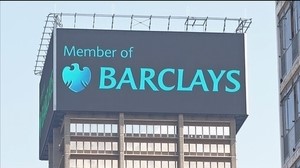By Ed Cropley
JOHANNESBURG (Reuters) - When Barclays (L:BARC) bought South Africa's Absa in 2005, wading back into a market it quit in the 1980s under pressure from anti-apartheid campaigners, the deal was trumpeted as a "tangible vote of confidence" in Africa's future.
Eleven years on, as the British banking giant looks to end more than a century of involvement on the continent by putting the 'For Sale' sign above its Africa business, it is hard not to conclude the opposite.
Barclays said it was selling down its 62.3 percent, 70 billion rand ($4.5 billion) stake in its Johannesburg-based subsidiary - which runs Absa in South Africa and Barclays-branded operations in 13 other countries - because of British regulations.
Barclays Africa chief executive Maria Ramos also said the decision had nothing to do with the outlook for Africa, pointing to a 10 percent rise in annual profit and 17 percent return on equity to support her view.
But these numbers are in local currency terms.
When translated into pounds - the only currency that matters to Barclays bosses in London - they tell a very different story, in particular the return on equity, which falls to 8.7 percent, below the parent bank's 11 percent target.
Over the last year, South Africa's rand
Over the decade since Barclays bought Absa, the decline is far larger, to the point that - despite a 70 percent share price rise - Barclays is likely to take home the same amount of money it spent in the first place.
SHORTAGE OF SUITORS
Furthermore, this assumes Barclays will be able to sell at Tuesday's share price of around 142 rand - an unlikely prospect given the absence of obvious suitors and the clouds looming over Africa's famously large horizons.
In its latest economic outlook, the IMF forecast sub-Saharan growth of 3.75 percent for this year, a sharp decline from pre-financial crisis levels and a prediction that gives the handful of potential Barclays Africa suitors a strong hand in any talks.
Analysts and mergers and acquisitions bankers say interest is possible from China - now Africa's largest trading partner - although the performance of the 20 percent in South Africa's Standard Bank bought by Industrial and Commercial Bank of China 601398.SS 1398.HK in 2008 has been underwhelming.
National Bank of Abu Dhabi [NBADHK.UL] and Qatar National Bank (QA:QNBK) are also possible bidders for the whole portfolio, although Qatar's strained diplomatic relations with Cairo might complicate any deal due to its Egypt component, Middle East banking sources said.
Speculation is also bound to swirl around Africa-focused bank Atlas Mara (L:ATMA), co-founded by former Barclays boss Bob Diamond, although it is hard to see Atlas, valued at just $320 million, raising sufficient quantities of cash.
Another option for Diamond's outfit is to team up with sovereign wealth funds or other financial investors and launch a joint bid as part of a consortium, one of the bankers suggested.
If these do not materialise, alternative outcomes for Barclays are breaking up the unit to sell off piecemeal, or keeping its hands on a minority stake. Barclays said on Tuesday it may keep a small non-controlling stake in Barclays Africa beyond the 2-3 year sale deadline.
ELUSIVE MIDDLE CLASS
The continent's prospects are nothing like as rosy as 2005, when Irish rocker Bob Geldof arm-twisted rich nations into writing off billions of dollars in defaulted African sovereign debt.
Freed from the burden of unpayable interest charges and boosted by a commodity price boom, the impact of technology such as mobile phones and a flood of 'Africa Rising' investment predicated on the emergence of a middle class, the continent embarked on a decade of unprecedented growth.
Last year's slowdown in China and the ensuing drop in demand for raw materials such as iron ore, copper and crude, has brought that to a juddering halt, exposing the fragility of African government finances and economies.
The case of Nigeria, its biggest economy, most populous nation and top crude producer, is telling.
Having relied on oil for 70 percent of its revenues and 90 percent of its dollars, Abuja has had to impose budget cuts and foreign exchange controls to protect the naira, which is now trading on the street at nearly half its official value.
Other commodity producers such as Ghana, Zambia and Angola have suffered similar fates.
Meanwhile, the hoped-for windfall has failed to materialise from a continental middle-class whose size varies from 327 million of Africa's billion plus population to just 16 million depending on whose daily income definition you accept - the African Development Bank's $2, or McKinsey's $55.
"It's become clear that most of the people portrayed as the new consumer class are not going to have jobs - and if you're not earning, you're not consuming and you're not borrowing," said Francois Conradie of NKC Africa Economists in Cape Town.
"Instead of having a big middle class, you're just going to have big slums - and that is a serious political problem."
($1 = 15.6701 rand)
